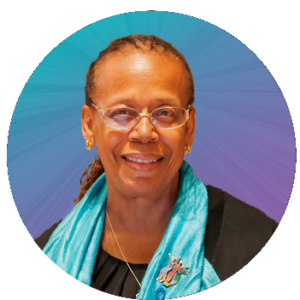Home > Advocacy For Patients > Grant & Awards > EDI Fund
The Dicey Scroggins Fund for Equity, Diversity, and Inclusion in Gynecologic Cancer Patient Outreach
We are thrilled to announce the recipients of the inaugural funding cycle of the Dicey Scroggins Fund for Equity, Diversity, and Inclusion in Gynecologic Cancer Patient Outreach. The fund, established to support innovative projects fostering inclusivity and addressing disparities in gynecologic cancer patient outreach and care, will support three outstanding initiatives for its first round of grants.
The IGCS received 33 competed proposals during the advertised application period between September 1 – October 3, 2023. The proposals were anonymized, then reviewed and scored by members of the IGCS Advocacy Committee which includes both clinicians and patient advocates/survivors. The scoring criteria ensured that the projects selected for funding would meet the main objective of the fund to promote inclusion and health equity in service of underrepresented populations. Additional considerations included project feasibility and ability to measure the outcomes and impact of the project at the end of the funding period (within one year).
The process was highly competitive — the dedication and innovation demonstrated in each of the remarkable proposals is commendable. The IGCS leadership recognizes the need for this newly established fund and is determined to continue its development, thus enabling the IGCS to support projects through this mechanism for years to come.
These three selected projects will receive financial support to further their initiatives, contributing to the fund's overarching mission of fostering equity, diversity, and inclusion in gynecologic cancer patient outreach.
Project: HER REASON FOR BEING: A Multifaceted Community-Based Project to Advance Cervical Cancer Prevention and Awareness
Project Lead: Ms. Salome Kwenda
Organization: Online Voices and Being Africa
Target Population: Women aged 15 to 50 years residing in Kenya
This project will take place throughout the five wards within the Lang'ata constituency in Nairobi City County. The goal is to reach women aged 15 to 50 years, providing crucial information and resources to enhance cervical cancer prevention efforts. A major goal of the project is to raise awareness about the causes, risk factors, and prevention of cervical cancer, and to reduce stigma and misinformation among the target population. Having secured cooperation from the medical community and ministry of health, the project will also include opportunities for cervical cancer screening and HPV vaccination drives. Plans to identify and train community champions and ambassadors will further support and spread awareness efforts.
By focusing on prevention, early detection, and education, Online Voices aims to create a sustainable model that can be replicated in other underserved regions, thus contributing to the global effort to eradicate cervical cancer.
Project: Nan men gran m'et la: Pilot Palliative Care Intervention for Vulnerable Women with Advanced Cervical Cancer in Haiti
Project Lead: Dr. Rebecca Henderson
Organization: Zanmi Lasante/University Hospital of Mirebalais, Haiti
Target Population: Gynecologic cancer patients residing in Haiti
Executed by a diverse team of experts drawn from the Dana Farber Cancer Center and the Massachusetts General Hospital and an on-the-ground clinical team from Zanmi Lasante, this project will address the unique challenges faced by vulnerable women with advanced cervical cancer in Haiti through the implementation of a pilot palliative care intervention.
By providing specialized care and support, the project aims to improve the quality of life for women facing advanced stages of cervical cancer in the region. The initiative will begin with a needs assessment and low-cost pilot intervention. Next, the team will implement a low-cost package of essential palliative care services and a brief educational intervention for care providers tailored to women’s needs identified in the research phase.
Project: Acceptability of Self-Sampling for Cervical Screening in the LGBTQIA+ Population – The Alternative Cervical Screening (ACES) LGBTQIA+ 2 Study
Project Lead: Dr. Jennifer Davies-Oliverira
Organization: University of Manchester
Target Population: LGBTQIA+ community vulnerable to cervical cancer
The ACES LGBTQIA+ 2 study explores the acceptability of self-sampling for cervical screening within the Lesbian, Gay, Bisexual, Transgender, Queer/Questioning, Intersex, and Asexual plus (LGBTQIA+) population. Despite a free, accessible, and well-organized UK cervical screening program, uptake in the LGBTQIA+ community is lower than for heterosexual and/or cisgender females, representing an important health inequity. The project seeks to understand opinions of those in the target population to address barriers to cervical screening in this diverse community, promoting inclusivity and accessibility in healthcare.
Utilizing qualitative research methods to build on knowledge from the ACES-LGBTQIA+1 study, the current ACES-LGBTQIA+2 study will employ interview and focus group data collection methods to enable purposive sampling to ensure intersectionality is accounted for, providing a diverse and equitable voice that will inform the future of cervical screening.

About the Dicey Scroggins Fund for Equity, Diversity, and Inclusion in Gynecologic Cancer Patient Outreach
This fund was established to support projects and initiatives that address disparities in gynecologic cancer patient care. By providing financial support to innovative and inclusive projects, the fund aims to contribute to a more equitable and diverse landscape in the field of gynecologic cancer research and outreach. Named in honor of Dicey Scroggins, the founder of IGCS’ global patient advocacy network, International Gynecologic Cancer Advocacy Network (IGCAN).
Equity, Diversity, and Inclusion
Equity, diversity, and inclusion are three closely linked values held by the IGCS and IGCANetwork. We uphold these values through our programming, collaborations, and communications aimed to include, listen to, and support different groups of individuals, including people of different races, ethnicities, socio-economic positions, religions, abilities, genders, and sexual orientations.
While low resource countries bear the largest cancer burdens, inequities in health and cancer care exist among different population groups within all nations, regardless of a country’s status as low-, middle- or high-income. There are a variety of systemic reasons why individuals with lower socio-economic positions have higher risks for poor health.
Equity
The fair distribution of resources, opportunities, and benefits, aiming to reduce and eliminate health disparities among different population groups. It involves identifying and addressing systemic barriers and structural inequalities that contribute to health inequities.
Diversity
The inclusion of individuals from different backgrounds and experiences, fostering a range of perspectives and ideas to inform decision-making and problem-solving in global health initiatives
Inclusion
to commit to ensure those of diversity feel welcome and included, to foster a sense of belonging and integration


|
We are pleased to offer this funding opportunity with the support of AstraZeneca and GSK |


